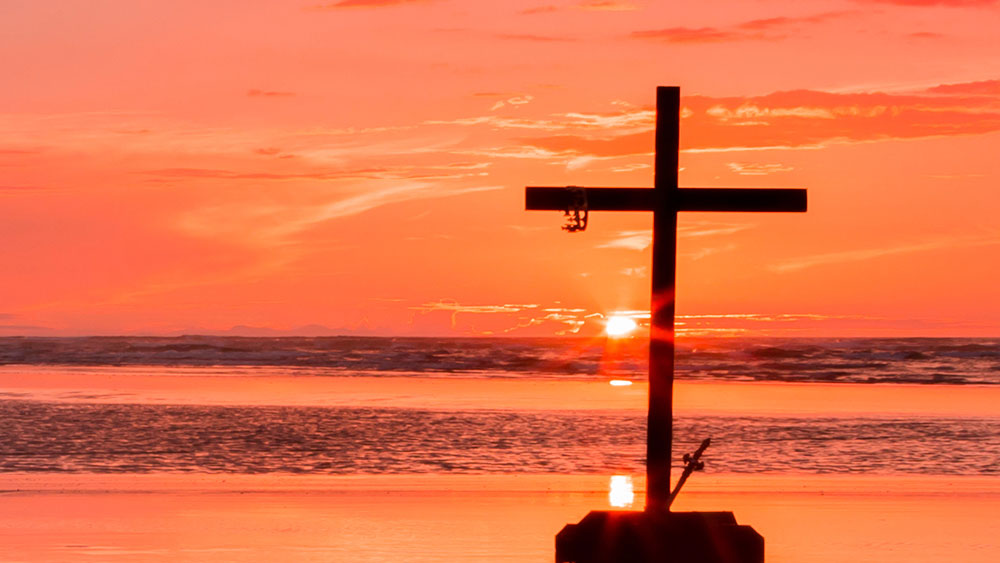“A disciple is not above the teacher, nor a slave above the master; it is enough for the disciple to be like the teacher, and the slave like the master. If they have called the master of the house Beelzebul, how much more will they malign those of his household! So have no fear of them; for nothing is covered up that will not be uncovered, and nothing secret that will not become known. What I say to you in the dark, tell in the light; and what you hear whispered, proclaim from the housetops. Do not fear those who kill the body but cannot kill the soul; rather fear him who can destroy both soul and body in hell. Are not two sparrows sold for a penny? Yet not one of them will fall to the ground apart from your Father. And even the hairs of your head are all counted. So do not be afraid; you are of more value than many sparrows. Everyone therefore who acknowl-edges me before others, I also will acknowledge before my Father in heaven; but whoever denies me before others, I also will deny before my Father in heaven. Do not think that I have come to bring peace to the earth; I have not come to bring peace, but a sword. For I have come to set a man against his father, and a daughter against her mother, and a daughter-in-law against her mother-in-law; and one’s foes will be members of one’s own household. Whoever loves father or mother more than me is not worthy of me; and whoever loves son or daughter more than me is not worthy of me; and whoever does not take up the cross and follow me is not worthy of me. Those who find their life will lose it, and those who lose their life for my sake will find it” (Matthew 10:24-39).
The week before this text from Matthew formed the basis of my sermon, many of us at Langley Mennonite Fellowship had the privilege of being witness to a baptism in the rock-studded river at Camp Squeah. I felt the weight and levity of this ancient Christian ritual, and was thankful that the passage was not read as we welcomed a new member into the family of faith, because Jesus reminds us how crappy it’s going to be. Since he was called Beelzebul, a name for the devil, Jesus told his disciples just how much more they will be maligned.
On the other hand, though, it is strangely appropriate for a three-fold Anabaptist baptism:
- First by the Holy Spirit;
- Then by water, the outward symbol of inward transformation; and
- Finally by blood and fire, which the Matthew passage is all about.
These verses and those just prior speak unabashedly about the realities Jesus’ disciples would face. Indeed, this was exactly what was happening to the small groups of followers in the communities to whom Matthew was writing. They were being maligned for following the devil instead of the true and living God, kicked out of their religious communities, dragged before courts, even killed for their witness. The servant is not greater than the master; as it was for Jesus, so it would be for them.
Nevertheless, Jesus insists, proclaim the gospel anyway. And not just in whispers, but be bold about it. Of course, the powers and principalities will oppose us. After all, they are of the darkness; we are of the light. They are wedded to violence and death; we are the people of peace and love.
Fortunately, we are offered comfort and assurance in the face of such persecutions. Several times in only a few verses we overhear Jesus telling his disciples that they need not fear. God knows us and loves us down to the hairs on our heads. We are of great worth. Calamity and strife should not be taken as signs that we have been abandoned by God.
But Jesus doesn’t stop here at the edge of our comfort zone. Without even clearing his throat, Jesus moves on and delivers the real zinger. It isn’t only persecution from outside the community that can be expected. Jesus invokes our worst fear: Not only the world out there will rebuke us and hurt us, it will also come from our own families, our own people. These are incredibly difficult words, particularly for a tradition that makes peacemaking central to its identity.
The sword of Christ
Some use these verses to show that Jesus wasn’t a pacifist: “I came not to bring peace, but a sword.” But if Jesus were talking about war, wouldn’t he have followed up with, “for I have come to set nation against nation,” instead of, “I have come to set a man against his father”? The sword spoken of here is not the sword of state violence, but the sword of God’s Word, a common metaphor in biblical passages such as Hebrews 4:12: “For the word of God is living and active, sharper than any two-edged sword.”
This sword that Jesus brings is one that cuts through our illusions and attachments to things that are not of God—even peace when it is not from God. In John 14:27, Jesus says: “Peace I leave with you; my peace I give to you. I do not give to you as the world gives.” Might it be that the peace Jesus is speaking of in Matthew 24—the peace that Jesus has not come to bring—is a peace comparable to the peace the world gives, the peace of the Pax Romana?
The peace of the world is a peace that is established through the threat and execution of violence. It is a peace that does one of two things to the enemy or the other. It either tries to make the other the same as us, or, failing that, to kill them or get rid of them in other ways. Become like us, get out, or be destroyed.
But this is not the peace of Jesus, which is why Jesus can say that one’s foes will be members of one’s own household, one’s own most precious community. Unlike the peace of Rome, which promises that one’s foes will be destroyed, the sword of Christ, which is the peace of Christ, promises that they will remain close at hand.
Enemies and others
Since the beginning of the church until now, the biggest struggles within the church have not been between those who acknowledge Jesus as Lord and those who do not, although that is often how we like to represent them. The crux of many conflicts in communities of faith is that there are genuine followers of Jesus of all stripes, persuasions and lifestyles. In the church we are set against one other because we are rich Christians, refugee Christians, lesbian and gay Christians, eco-justice Christians and SUV-driving Christians. All of us acknowledge Jesus, sometimes in very loud voices from our rooftops.
“I have come to bring this sword of division,” says Jesus. “So don’t be afraid.”
But how can we not be afraid when our beloved church seems poised to be hijacked by those seriously misguided others who are so wholly mistaken that their very presence among us spells the certain demise of the church?
And so in our fear we usually respond to the threatening other in exactly the same way the worldly powers insist we must: We either try to convert them to our point of view, or, failing that, to get rid of them by revoking their membership, banning their presence or simply making them feel unwelcome. We choose the peace the world gives.
A different kind of peace
But Jesus did not come to bring that peace, which is why his peace is a lot more like the conflict of a man set against his father and a mother against her daughter. The peace of Jesus does not mean fusion or unity-as-sameness. And this is because the peace of Christ is found by taking up the cross and following daily, if we want to be worthy of Jesus.
When we say yes to taking up our cross and following Jesus, we are saying yes to a world that is not of our own making. We are out of control.
Under the Roman Empire, taking up the cross was not, as it has often become today, a metaphor for accepting the hardships of life. Taking up the cross was not even simply a way of saying one should expect persecution and division. More radically and most importantly, taking up the cross indicated the type of response Jesus’ followers were to embody in the face of such persecution and division. As opposed to taking up weapons and following Jesus, taking up the cross is a readiness to forsake any and all power we might have in this world, to be stripped naked and vulnerable, and to open our arms wide and rely only on the mercy of God.
When our love for others—whether outside or inside our communities—is grounded in taking up the cross and following Jesus, we can finally lay down our weapons and surrender to the other—letting the other be “other.” Then, perhaps, our love of the other will not seek to make them the same or, failing that, exterminate or excommunicate them.
Follow, act, go
So what do we do with our church full of rich Christians, refugee Christians, lesbian and gay Christians, eco-justice Christians and SUV-driving Christians? We debate, we proclaim our truth from the rooftops, we discern together, and we are, not infrequently, set against one another, just as Jesus promised.
But no one takes up the power to exterminate or excommunicate anyone. That is never a response worthy of Jesus. Rather, we take up the cross and follow. Somehow we hang in together and keep moving along on our journey of faith. It is important to emphasize the following part, as conflict has a tendency to paralyze and adhere to the status quo. But following is a non-negotiable part of the package. We follow, we act, we go.
What will finally save the church will not be another five years of good process and a re-writing or re-confirmation of the Confession of Faith in a Mennonite Perspective. What will save the church will be Jesus—as we faithfully take up the cross and follow—laying down our weapons and surrendering to that which we most fear will destroy us, trusting only in God’s assurance that in losing our life we will save it.
We are of value. We are loved. We will not be abandoned even in our darkest hour. The servants are not greater than the master. This is how it was for Jesus, and this is how it will be for us.
Of course the comfort and assurance offered in the midst of internal, as well as external, strife still stands. But we have nothing to fear. As a friend and colleague of mine has said, “Remember, there is no place for us to fall but always and ever into the arms of everlasting mercy. God has promised that it is so.”
Is this dangerous? Is this risky? Absolutely! But any woman who has given birth can tell you that anything worth its salt is risky! Every promise worth believing in is also a threat. There is just no easy way about it. This is our baptism.
We lose everything. We are out of control. We stand before one another as our vulnerable selves, laying down our power of office, status, race, gender or schooling. And then we follow Jesus. We move. We act. And there we find our life.
See the sidebar to this story, "Correcting a common misunderstanding."
For discussion
1. What are some of the issues of disagreement in your family or congregation? Under what conditions do these disagreements threaten the well-being of the family or congregation? How can congregations and families get along in spite of differences?
2. Anita Fast says that taking up the cross means giving up power and relying on the mercy of God. Why is it so difficult to do this? Why are we so determined to change other people? Can you think of role models in your church who allow their vulnerability to show?
3. Fast interprets Matthew 24:37 to mean that, of course, we need to love our families, but that the love needs to be grounded in Jesus. Does this interpretation fit with your understanding of Jesus? Are there any circumstances where it is appropriate to disown someone in the family or congregation?
4. To save the church we need to surrender ourselves to “that which we most fear will destroy us,” says Fast. Do we fear loss of control more than we trust that God can preserve us in the midst of calamity and strife? What are our greatest fears?
—By Barb Draper








Leave a Reply
You must be logged in to post a comment.